

Therapy at Rehaklinik Zihlschlacht
The independence of our patients and the restoration of their mobility are our main goals. To this end, our highly specialized and versatile team uses the most effective and advanced therapies. In conjunction with everyday activities, we achieve the jointly established rehabilitation goals and help our patients find their way back to everyday life.
The interdisciplinary treatment concept is the basis for the comprehensive and multifaceted range of therapies offered at the Rehaklinik Zihlschlacht. Neurological rehabilitation as practiced at the clinic is based on 24-hour availability. Patients receive treatment, care and therapy around the clock. Comprehensive counseling and support of the patient's family is an essential factor for successful rehabilitation.
Main areas of our therapies
Smart Care digital aid | Neuropsychology / clinical Psychology | Occupational Therapy | Music Therapy | Therapeutic singing group | Orthoptics | Speech Therapy | Horse-assisted therapy | Sensory motor therapies | Non-invasive brain stimulation | Nutritional Therapy | Post-Covid-Rehabilitation | (Neuro)-Urology | Urotherapy
Smart Care – Using digital aids in everyday life
Smartphones, smartwatches, voice assistants—digital devices have become an integral part of everyday life. However, many of their functions remain unused, especially when it comes to health, independence, and making everyday life easier. With Smart Care, we support you in using digital technologies in a meaningful and simple way. Whether it's a pedometer, medication reminders, or helpful apps, we show you how you can use your devices in a targeted manner. We accompany you step by step in personal consultations, providing individualized and understandable support. Smart Care is aimed at anyone who already owns a smartphone or smartwatch and is open to trying new things, regardless of age or prior knowledge.
Take the next step toward digital independence—we are here for you.
To learn more about Smart Care or to book a consultation, please reach out to our International Office.
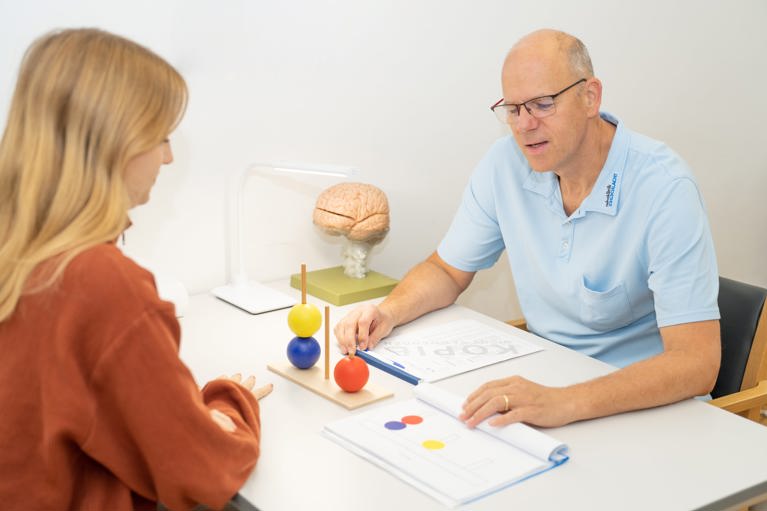
Neuropsychology / Clinical Psychology
Neuropsychological therapy involves examining cognitive functions such as concentration, memory, logical thinking, etc. in patients with neurological disorders. Therapeutic measures are used to improve the performance impaired by the disorder, thereby enabling the patient to reintegrate into their professional and private life as fully as possible. In addition, an assessment of the patient's performance is carried out, identifying any residual deficits in everyday life.
In addition, counseling and psychotherapeutic measures in individual or group settings accompany the process of coping with the illness. Patients are supported in finding their way in their changed life situation and in developing strategies for dealing with the illness.
Neuropsychological therapy at the Rehaklinik Zihlschlacht includes the following measures:
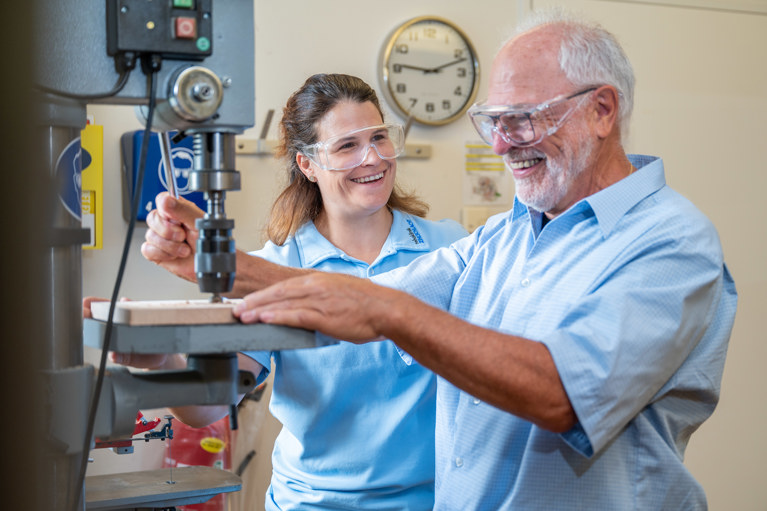
Occupational Therapy
In occupational therapy, an individual work and occupational history is compiled for working patients of working age, taking into account the workplace environment and contextual factors in order to accurately assess the job-related work requirements. After a detailed assessment, work and stress assessments are used to identify deficits and promote resources.
The overarching goal is to return to work as soon as possible, to build up a level of performance that is not overly demanding, with work trials and gradual reintegration.
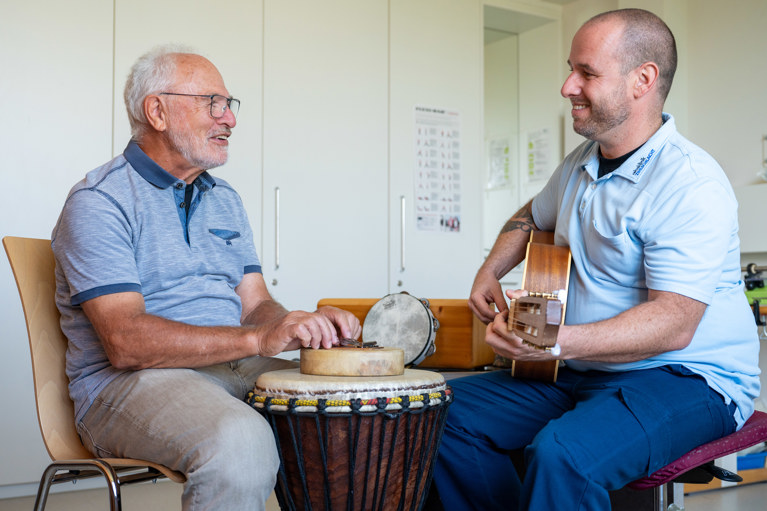
Music therapy
Music therapy enables experiences on various levels.
- Stabilization
- Improves quality of life
- Unleashes creativity
- Helps with communication disorders
- Promotes alertness
- Helps with tension
In music therapy, nonverbal, emotional, and verbal forms of dialogue complement each other. It is a psychotherapeutically oriented method. Its fundamental factor is resonance. Music therapy is offered in individual and group therapy sessions.
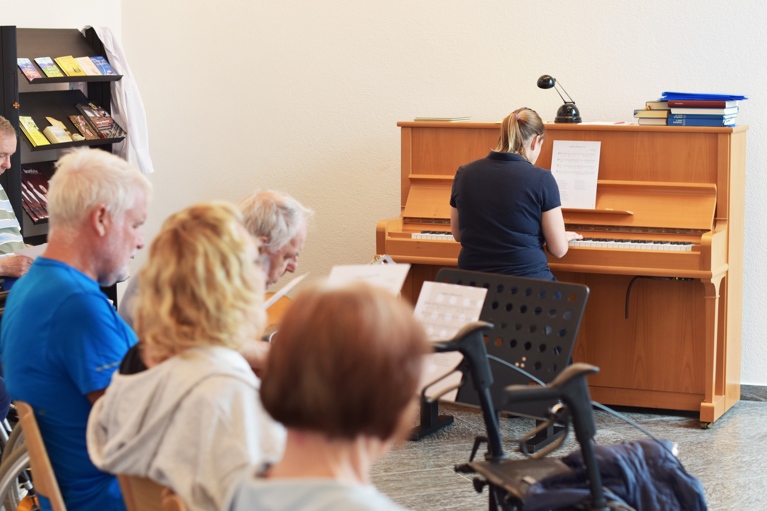
Therapeutic singing group
Singing brings people together and can have a healing effect. Our therapeutic singing group warmly invites patients to experience the joy of singing and making music together. In a safe environment, we use music to strengthen mental well-being and promote social interaction. Participation is open to anyone who is curious and enjoys singing together.
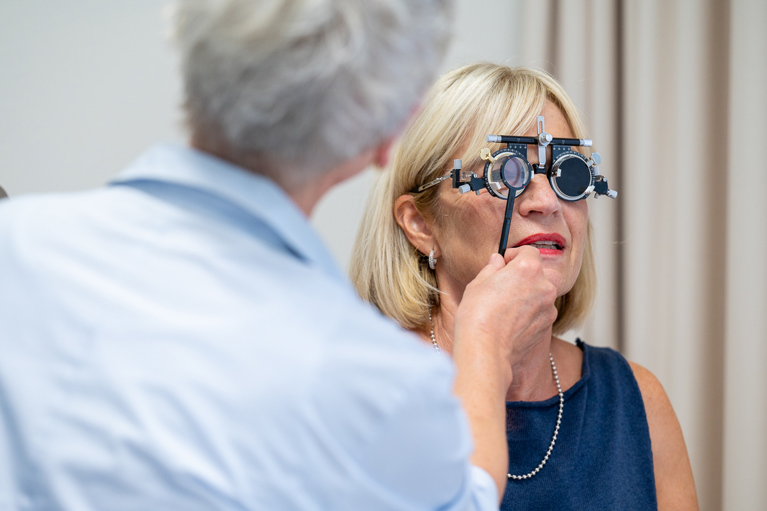
Orthoptics
Orthoptics (orthos = straight, correct) is a branch of ophthalmology that deals with the diagnosis and treatment of visual disorders. It focuses in particular on visual field defects, eye movement disorders, and poor visual acuity.
Visual disturbances are often the result of brain injury. They make everyday life difficult and, in combination with other impairments such as gait disorders, can be particularly stressful.
Double vision, visual field defects, and blurred vision impair both visual orientation and reading. These phenomena are often very disturbing for those affected and their social environment. They therefore require careful diagnosis and treatment.
The neuro-ophthalmology department at the Rehaklinik Zihlschlacht offers comprehensive care and treatment by specialized orthoptists (specialists in ophthalmology). If necessary, the clinic's consulting ophthalmologist is consulted.
The aim is to treat visual impairments through optical corrections, compensatory training, or special aids in order to make everyday life easier for those affected.
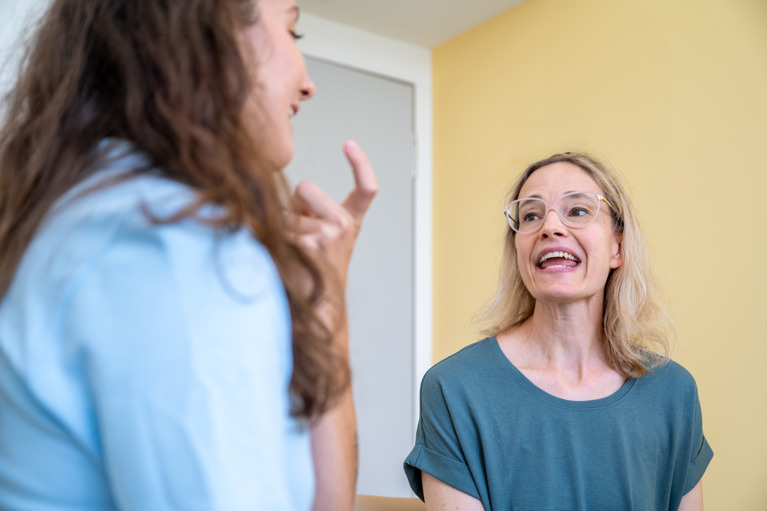
Speech therapy
Speech therapy deals with the diagnosis and treatment of neurological speech, language, voice, chewing, and swallowing disorders, as well as facial paralysis. These symptoms can impair people's ability to communicate, their quality of life, and their participation in social life.
Our services include in particular:
- Individual and group therapy
- Diagnosis of language and speech according to the status quo of standardized test procedures
- Clinical and instrumental diagnosis of swallowing (FEES)
- Speech and language therapy using the latest digital and conventional therapy methods
- Use of biofeedback, bioimpedance measurements, and electrostimulation for swallowing disorders
- Treatment of patients with tracheostomy tubes
- Involvement of relatives in individual consultations and group discussions
- Aftercare services
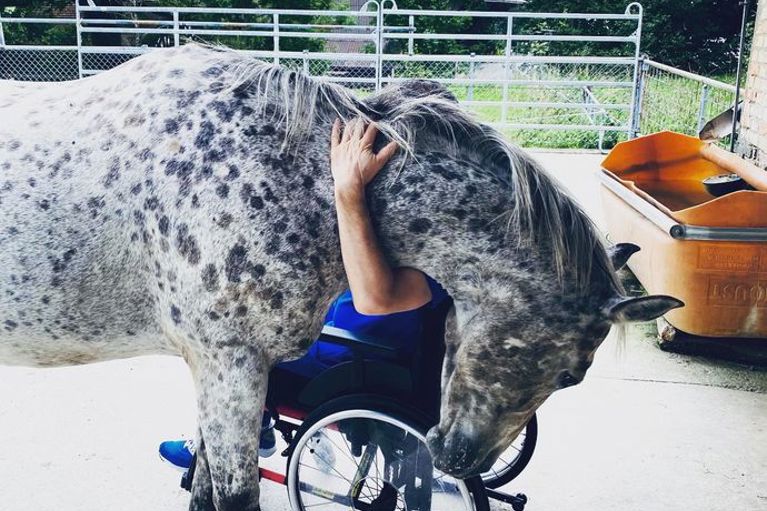
Horse-assisted therapy
Therapeutic riding – therapy with horses
Therapeutic riding is a holistic form of therapy that addresses the body, mind, and soul. The focus is on individual support, not on teaching riding skills. The special relationship with the horse strengthens social, emotional, cognitive, and motor skills. This therapy helps to overcome stress, anxiety, and excessive demands and gives new zest for life.
The Hummelberg Therapy Farm is more than just a place for therapeutic riding – it offers people with mental or physical disabilities a place of peace, support, and reintegration.
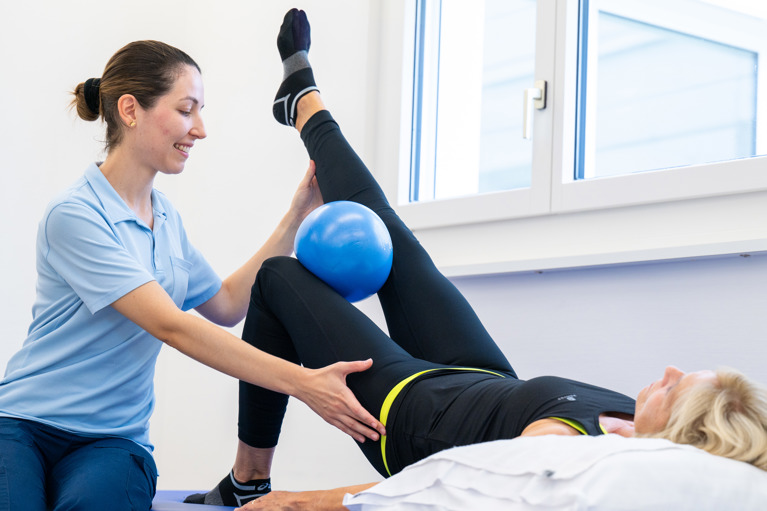
Sensory motor therapies
The range of sensorimotor therapies on offer is also wide, as these are essential for successful rehabilitation:
- Physiotherapy/sports therapy
- Occupational therapy
- Physical therapy
- Robotics
- Water therapy
- Qigong
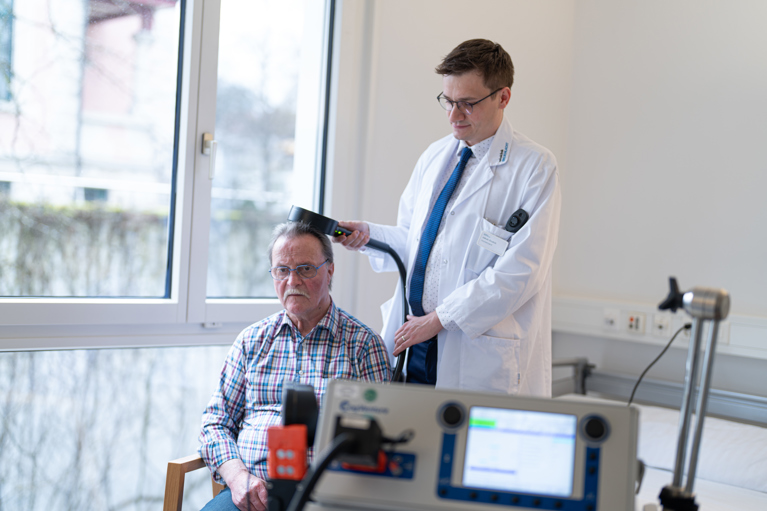
Non-invasive brain stimulation
We offer innovative, research-based brain stimulation treatments for neurological conditions. These include repetitive transcranial magnetic stimulation (rTMS) for patients with post-stroke neglect and transcranial pulse stimulation (TPS) for individuals with mild to moderate Alzheimer’s disease. Both therapies are noninvasive and well tolerated. They aim to support specific brain functions.
Learn more about our Neuromodulation Center here.
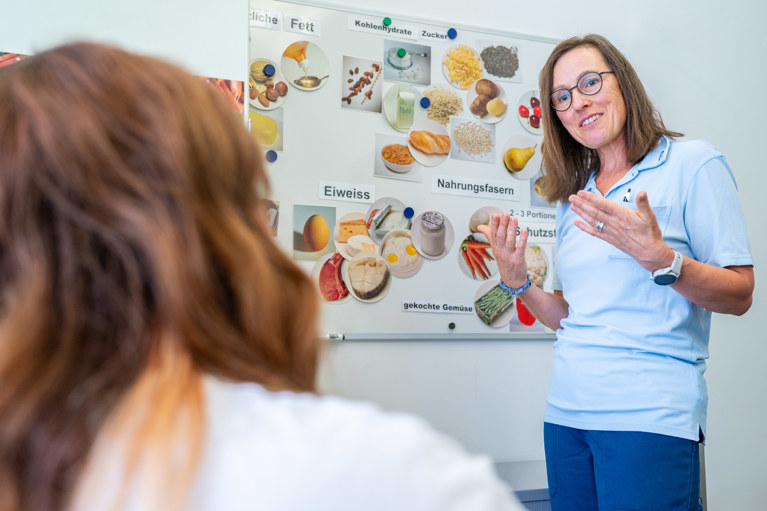
Nutritional therapy
The nutritional counseling team supports patients with various nutritional problems. We place great importance on individual needs and a diet that meets those needs.
During the rehabilitation stay, nutritional therapy is used in the following cases:
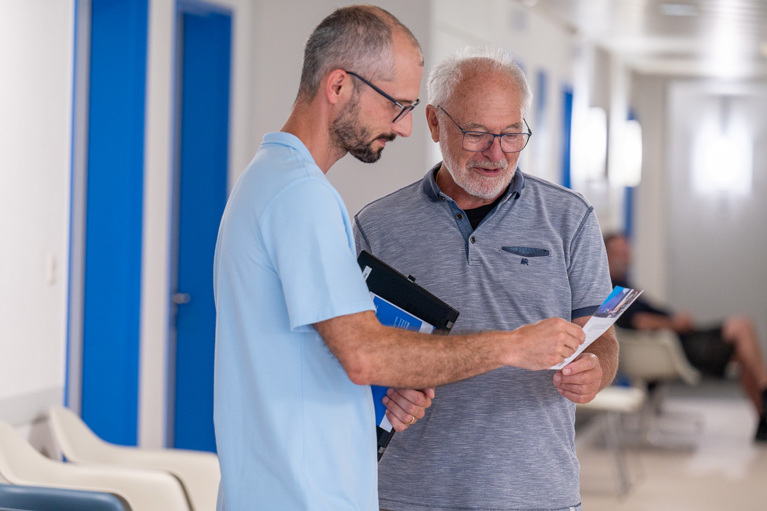
Post Covid Rehabilitation
The most common long-term effects of COVID-19 are pathological fatigue with excessive exhaustion. Patients who have spent a long time in intensive care often also develop a condition called Critical Illness Polyneuromyopathy, which causes paralysis. Almost half of all cases suffer from cognitive disorders. Our clinic is able to treat even severely affected patients at a very early stage, which can be absolutely crucial for the healing process.
Another group of patients is those who suffer from the consequences of a stroke, MS, Parkinson's disease, Guillain-Barré syndrome, or other neurological diseases and have also suffered a coronavirus infection, meaning they are doubly burdened and have to cope with long-term effects. We have also developed a special rehabilitation program for these patients to help them return to an independent everyday life as quickly as possible.
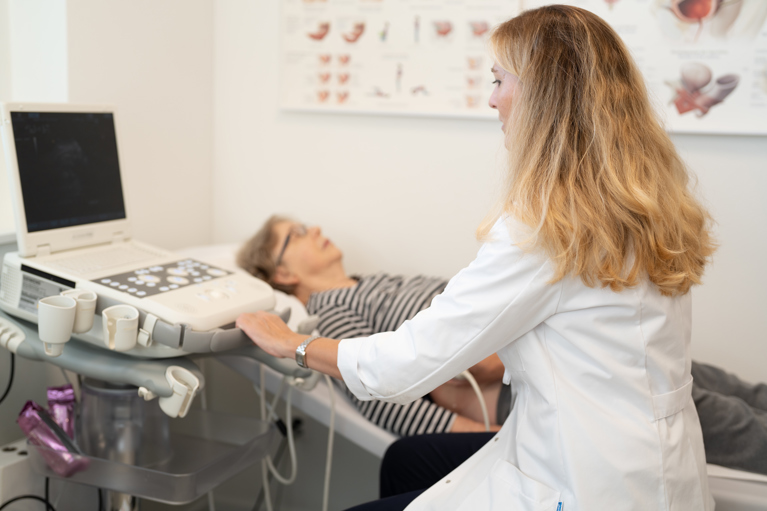
(Neuro)-Urology
At the Rehaklinik Zihlschlacht, we offer comprehensive (neuro)urological and urotherapeutic care for both inpatients and outpatients.
Thanks to our long-standing cooperation with the urology department at Spital Thurgau AG, we provide care and advice to our patients here in Zihlschlacht and, if necessary, at the Münsterlingen site of Urologie STGAG.
Urology is a branch of medicine. It deals with the organs that produce and excrete urine, i.e. the structure, function, and diseases of the kidneys, ureters, bladder, and urethra, as well as the male reproductive organs. The Rehaklinik Zihlschlacht also covers the treatment of urogynacological complaints, in particular problems caused by pelvic floor weakness and/or a change in the position of the genital organs.
Neuro-urology deals specifically with the diagnosis and treatment of disorders of the bladder, sphincter, intestines, and sexual function that are caused by neurological diseases.
- Sonography
- Uroflowmetry (urine flow measurement)
- Urodynamics (bladder pressure measurement)
- Cystoscopy (bladder examination)
- Insertion of a suprapubic indwelling catheter
- Botulinum toxin injection into the bladder
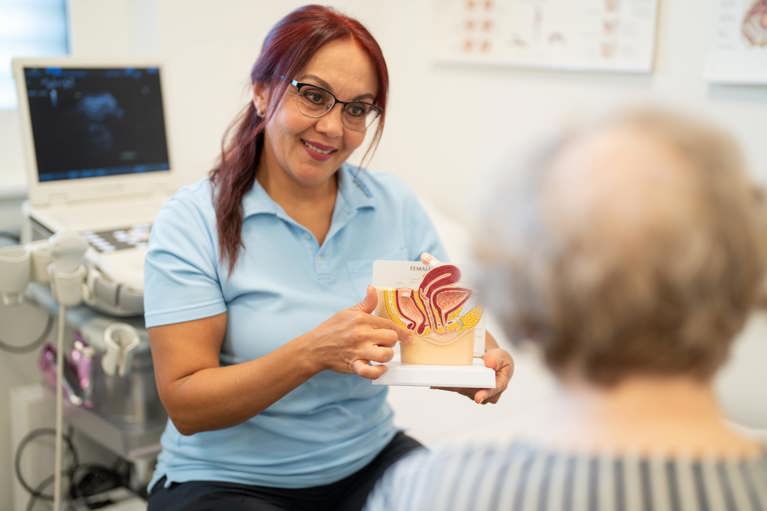
Urotherapy
Urotherapy encompasses the diagnosis, treatment, and care of people with functional, organic, and neurogenic bladder and bowel dysfunction. It includes non-surgical and non-medicinal therapies, as well as support for affected individuals undergoing surgical and medicinal treatment. The goals are to maintain kidney function, improve quality of life, achieve continence for social integration, and increase everyday competence.
- Counseling on bladder dysfunction and urinary incontinence
- Instructions on drinking and eating habits
- Instructions on optimal urination behavior
- Bladder training
- Behavioral therapy
- Intermittent self-catheterization (counseling, instruction, and review)
- Counseling on fecal incontinence and bowel management
- Electrostimulation (transdermal and with vaginal or anal probe) to positively influence the overactive bladder and pelvic floor training/innervation training
- Urinary tract infection prevention strategies
- Sexual dysfunction
- Advice, care, and support with the provision of aids (incontinence materials, catheters, urinary condoms, vaginal and rectal tampons)
These services are available in both inpatient and outpatient settings. As a patient, you are welcome to actively register with us during your rehabilitation, or you will be registered for urological and/or urotherapeutic care in consultation with your ward physician.
Hear from our therapists
In neurological rehabilitation, it is crucial that patients feel understood – not only medically, but also linguistically and culturally. That is why we not only offer our international patients interpreting services at Rehaklinik Zihlschlacht, but also therapies in their mother tongue whenever possible.
In order to guarantee our international patients the best possible care, we regularly hire therapists from abroad. Two current examples: the occupational therapist Aya and speech therapist Hiyam were with us to care for our Arabic-speaking patients.
Watch the video with occupational therapist Aya here:

Contact
International Office
Kerstin Rizzello & Luca Zimmermann
Tel.: +41 71 424 33 66
E-Mail: international@vamed.ch




